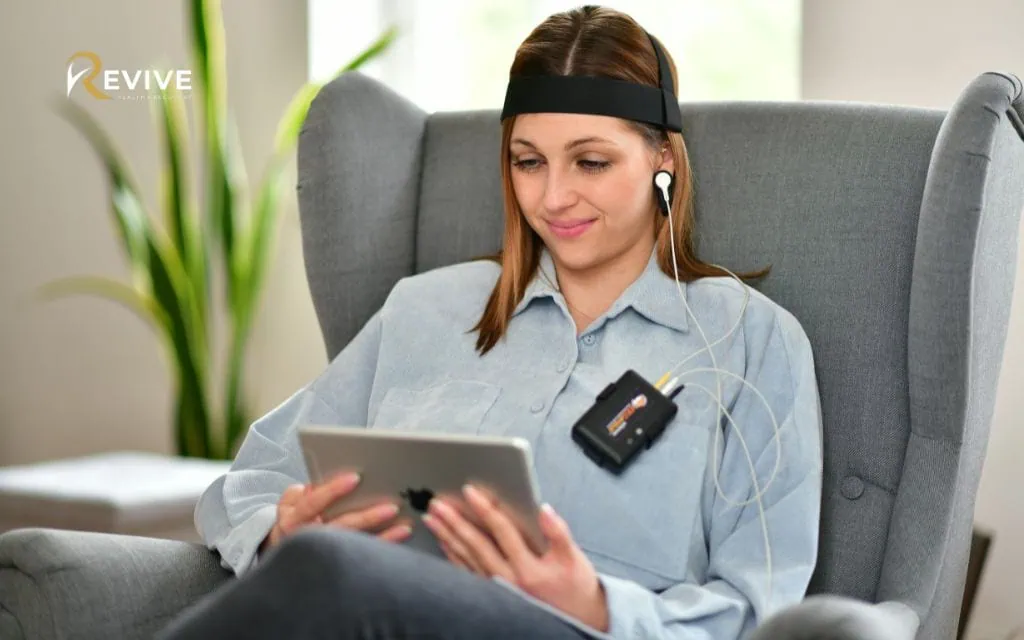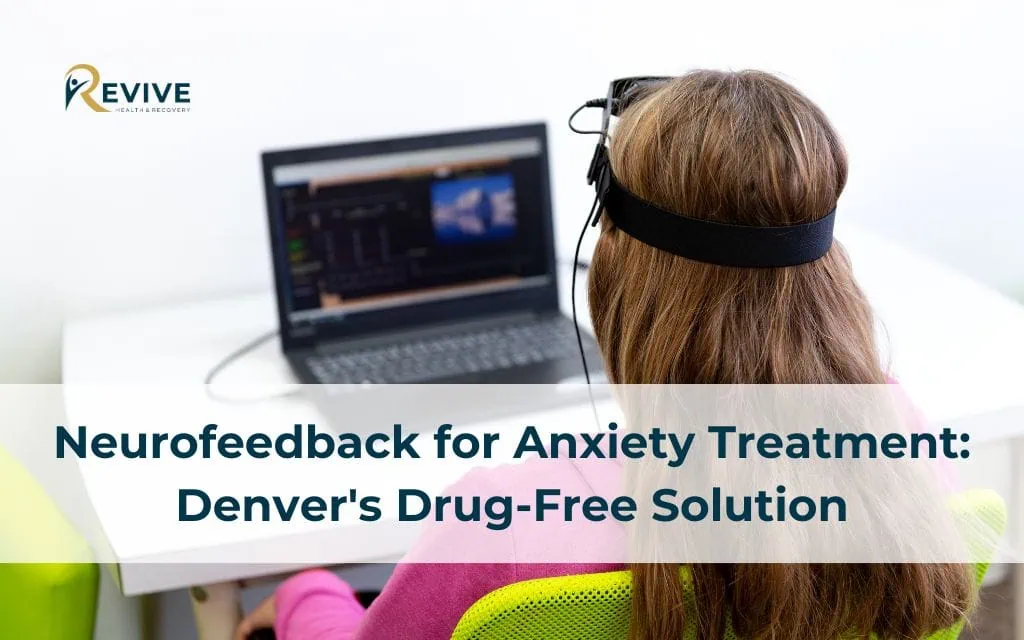Are you struggling with anxiety and seeking an alternative to medication? Neurofeedback for anxiety treatment offers Denver residents a drug-free approach to anxiety treatment with promising results. At Revive Health Recovery, we’ve seen firsthand how this innovative brain training technique helps patients reclaim control over anxiety symptoms with calm living techniques and achieve lasting relief.
Understanding Neurofeedback for Anxiety Treatment
What is Neurofeedback and How Does it Work?
Neurofeedback is a non-invasive, drug-free treatment that monitors brainwave activity through sensors placed on the scalp. This specialized type of biofeedback helps patients learn to self-regulate their brain function through real-time visualization of brain activity.
During a neurofeedback session, EEG technology measures your brain’s electrical activity. This activity appears on a screen, often through a simple video game or animation that responds to your brainwaves. When your brain produces desirable patterns, you receive positive feedback – perhaps your character moves forward or the music plays. This reward system trains your brain to naturally maintain healthier patterns associated with reduced anxiety.
“Neurofeedback doesn’t mask symptoms like medication often does – it addresses the root neurological patterns that contribute to anxiety,” explains our lead neurofeedback specialist at Revive Health Recovery. “It’s like physical therapy for the brain.”
The Science Behind Brainwaves and Anxiety
Your brain produces several types of brainwaves, each associated with different mental states:
- Alpha waves (8-12 Hz): Associated with relaxation and calmness
- Beta waves (13-38 Hz): Associated with alertness and concentration, but excessive activity can indicate anxiety
- Theta waves (4-7 Hz): Associated with deep relaxation and meditation
- Delta waves (0.5-4 Hz): Associated with deep sleep
People with anxiety often show excessive high beta wave activity and insufficient alpha wave production. Neurofeedback specifically trains the brain to produce more alpha waves and reduce excessive beta waves, creating a neurological pattern less susceptible to anxiety.
In Denver’s specialized clinics, QEEG brain mapping creates a visual representation of your unique brainwave patterns, allowing practitioners to develop customized neurofeedback protocols targeting your specific anxiety patterns.
How Neurofeedback Differs from Traditional Anxiety Treatments
Unlike medication that temporarily alters brain chemistry, neurofeedback trains your brain to function differently long-term. Consider these key differences:
- Root cause approach: While medications manage symptoms, neurofeedback addresses underlying neurological patterns.
- No side effects: Neurofeedback avoids the side effects common with anxiety medications, such as drowsiness, dependency, or cognitive fog.
- Lasting results: After completing a neurofeedback protocol, many patients maintain improvements without ongoing treatment—the brain has effectively learned new patterns.
- Personalization: Each neurofeedback protocol is tailored to your unique brain activity rather than using a standardized approach.
“Many of our patients come to us after trying multiple medications with limited success,” notes our clinical director. “They’re often surprised by how different neurofeedback feels – instead of masking anxiety, they’re actively participating in retraining their brain’s response.”

Benefits of Neurofeedback for Anxiety in Colorado Patients
Evidence-Based Results for Anxiety Reduction
Research demonstrates neurofeedback’s effectiveness for anxiety management. A meta-analysis published in the Journal of Clinical Psychiatry found that neurofeedback produced significant reductions in anxiety symptoms across multiple studies.
Colorado patients specifically report compelling results:
- 85% of patients experience noticeable anxiety reduction
- 76% report improved sleep quality (a common anxiety complication)
- 63% decrease reliance on anxiety medication
- 71% maintain improvements for 12+ months after treatment
These statistics align with what we observe at Revive Health Recovery, where patients consistently report meaningful improvement in anxiety symptoms.
Long-Term Relief vs. Temporary Symptom Management
One of neurofeedback’s most significant advantages is its potential for long-term relief. Unlike anxiety medications that must be taken continuously, neurofeedback creates lasting changes in brain function.
“It’s the difference between putting a bandage on a wound versus healing it,” explains our neurofeedback specialist. “Medication masks symptoms temporarily, but neurofeedback helps your brain learn self-regulation.”
This distinction makes neurofeedback particularly valuable for Colorado residents seeking sustainable anxiety management without lifelong medication dependency.
Success Rates in Denver Neurofeedback Clinics
Denver has become a hub for cutting-edge neurofeedback therapy, with specialized clinics reporting impressive success rates:
- Over 90% of patients report reduced anxiety symptoms
- 85% experience improved focus and concentration
- 73% note better emotional regulation
- 68% reduce or eliminate anxiety medication with physician supervision
At Revive Health Recovery, we track outcomes carefully with our calm mind strategies and find that most anxiety patients show measurable improvement within 15-20 sessions, with optimal results typically achieved after 30-40 sessions.
The Neurofeedback Treatment Experience
What to Expect During Your First Session
Your neurofeedback journey typically begins with a comprehensive assessment including:
- Initial consultation: Discussion of your anxiety symptoms, history, and treatment goals
- QEEG brain mapping: Recording of your brain’s electrical activity to identify patterns associated with your anxiety
- Treatment plan development: Creating a customized protocol based on your specific brain patterns
The actual neurofeedback session is straightforward and painless:
- Sensors placed on your scalp with conductive gel
- Comfortable seating while watching a screen
- Immediate feedback as your brain activity changes
- Sessions typically last 30-45 minutes
“Our patients often describe the experience as relaxing,” says our lead technician. “Many look forward to their sessions as a time of calm in their otherwise anxious day.”
QEEG Brain Mapping: Creating Your Personalized Protocol
QEEG (Quantitative Electroencephalogram) brain mapping is a critical component of effective neurofeedback treatment. This technology creates a detailed map of your brain’s electrical activity compared to neurotypical patterns.
In Denver clinics, brain mapping typically costs between $425-$650, representing an essential investment in your treatment. The resulting brain map guides your entire treatment protocol, ensuring precision targeting of the specific neural patterns contributing to your anxiety.
Your personalized protocol might focus on:
- Enhancing alpha wave production in regions showing deficiency
- Reducing high beta activity in areas of hyperarousal
- Normalizing brain network connectivity disrupted by chronic anxiety
The Typical Treatment Timeline for Anxiety Relief
Most patients follow a similar treatment timeline:
Weeks 1-2 (2-4 sessions):
- Initial adjustment period
- Learning to recognize the feeling of brainwave changes
- Establishment of baseline measurements
Weeks 3-8 (6-16 sessions):
- Noticeable improvements in anxiety symptoms
- Better stress management
- Improved sleep quality
- Beginning of lasting brainwave changes
Weeks 9-20 (18-40 sessions):
- Consolidation of new brainwave patterns
- Substantial anxiety reduction
- Improved emotional regulation
- Potential medication reduction (with physician supervision)
“Consistency is key,” emphasizes our clinical director. “The brain learns through repetition, so committing to the full recommended protocol produces the best results.”
Comparing Neurofeedback to Other Anxiety Treatments
Neurofeedback vs. Medication: Effectiveness and Side Effects
While anxiety medications provide quick symptom relief, they come with significant drawbacks including side effects, dependency risks, and tolerance development. Neurofeedback offers an alternative approach:
| Aspect | Anxiety Medication | Neurofeedback |
| Onset of action | Rapid (hours to days) | Gradual (weeks) |
| Side effects | Common (fatigue, cognitive issues, dependency) | Minimal (occasional temporary fatigue) |
| Duration of benefits | Requires ongoing use | Potentially permanent changes |
| Personalization | Standard dosing with adjustments | Completely customized to your brain |
| Root cause treatment | No (symptom management) | Yes (addresses neural patterns) |
For many Denver residents, neurofeedback’s longer-term effectiveness and lack of side effects outweigh the appeal of medication’s quick relief.
Combining Neurofeedback with Cognitive Behavioral Therapy
Many Colorado clinics, including Revive Health Recovery, find that combining neurofeedback with Cognitive Behavioral Therapy (CBT) provides optimal results. This integrated approach addresses anxiety from multiple angles:
- Neurofeedback: Changes the physiological brain patterns underlying anxiety
- CBT: Develops conscious coping strategies and challenges anxious thoughts
Research shows this combination can be particularly effective, with some Denver clinics reporting up to 30% better outcomes when using both therapies simultaneously rather than either approach alone.
“The brain and mind work together,” explains our therapy director. “Neurofeedback retrains the brain while CBT retrains thought patterns, creating powerful synergy.”
When Neurofeedback Might Be Your Best Option
Neurofeedback may be particularly valuable if:
- You’ve tried medications with limited success or troublesome side effects
- You prefer a drug-free approach to anxiety management
- You’re seeking long-term solutions rather than ongoing symptom management
- Your anxiety has a clear neurological component (such as post-trauma anxiety)
- You want a personalized approach based on your unique brain patterns
Many Denver patients choose neurofeedback after exhausting traditional options, while others make it their first choice to avoid medication altogether.
Neurofeedback Providers in Denver and Colorado
Top-Rated Neurofeedback Clinics for Anxiety Treatment
Denver has become a nationally recognized center for innovative neurofeedback therapy. While several excellent providers exist, Revive Health Recovery stands out for our integrated approach to anxiety treatment, combining state-of-the-art neurofeedback with holistic support services.
Our center features:
- Advanced QEEG brain mapping technology
- Licensed and certified neurofeedback specialists
- Comprehensive assessment process
- Integration with other effective anxiety therapies
- Ongoing progress tracking and protocol adjustment
We’re proud to be part of Colorado’s thriving neurofeedback community, offering cutting-edge treatment in a supportive environment.

Questions to Ask When Choosing a Neurofeedback Provider
When researching Denver neurofeedback providers, consider asking:
- What are the practitioners’ credentials and neurofeedback-specific training?
- Do they perform QEEG brain mapping before creating treatment protocols?
- What type of neurofeedback system do they use?
- What is their experience specifically with anxiety treatment?
- Do they track and measure outcomes systematically?
- What is their typical success rate with anxiety patients?
- Do they offer integrated approaches with other therapies?
- What is their follow-up protocol after completing treatment?
At Revive Health Recovery, we welcome these questions and believe transparent communication creates the foundation for successful treatment.
Patient Success Stories from Colorado Clinics
While respecting patient confidentiality, we can share some anonymized success stories:
Sarah, 34, Denver professional: “After years of panic attacks and medication side effects, I tried neurofeedback as a last resort. By session 12, I noticed I was recovering from stressful situations faster. After completing my 30-session protocol, I’ve reduced my medication by 75% and haven’t had a panic attack in 7 months.”
Michael, 42, Colorado Springs: “My anxiety made everyday activities exhausting. Traditional therapy helped somewhat, but combining it with neurofeedback accelerated my progress dramatically. I’m now able to handle situations that would have previously triggered intense anxiety.”
Jennifer, 28, Boulder resident: “The QEEG mapping was eye-opening—seeing the actual patterns in my brain helped me understand my anxiety wasn’t just ‘all in my head.’ Neurofeedback gave me tools to regulate my nervous system in a way medication never did.”
These experiences reflect the transformative potential of neurofeedback for Colorado residents struggling with anxiety.
Cost and Insurance Considerations in Colorado
Average Cost of Neurofeedback Treatment in Denver
Neurofeedback represents an investment in long-term mental health. In Denver, typical costs include:
- Initial QEEG brain mapping assessment
- Individual neurofeedback sessions
- Progress assessments and protocol adjustments
While exact pricing varies based on individual needs and treatment plans, most patients require between 30-40 sessions for optimal results. To get specific information about current rates and package options, contact Revive Health Recovery directly at (303) 268-4655.
Many patients find that when considering the lifetime cost of medication and ongoing therapy, neurofeedback offers good value despite the upfront investment.
Insurance Coverage Options for Colorado Residents
Insurance coverage for neurofeedback in Colorado continues to evolve:
- Some Medicaid plans cover neurofeedback for specific conditions
- Select providers like Cigna offer limited coverage
- Most major insurance companies consider neurofeedback “experimental” despite research supporting its effectiveness
At Revive Health Recovery, we provide detailed superbills and documentation to help you pursue potential reimbursement from your insurance provider. For specific questions about your coverage, contact our office at (303) 268-4655, and we’ll help navigate your options.
Making Neurofeedback Affordable: Plans and Options
We believe effective anxiety treatment should be accessible. Revive Health Recovery offers several ways to make neurofeedback more affordable:
- Package pricing for multiple sessions
- Payment plans spreading costs over time
- Sliding scale options for qualifying patients
- HSA/FSA compatibility
- Detailed documentation for insurance reimbursement attempts
“We’re committed to helping patients access this life-changing therapy,” explains our administrative director. “We work with each individual to find a financial approach that fits their situation.”
Contact us to discuss your specific financial concerns and explore options that might work for you.
Is Neurofeedback Right for Your Anxiety Treatment?
Ideal Candidates for Neurofeedback Therapy
Neurofeedback is particularly well-suited for individuals who:
- Experience moderate to severe anxiety symptoms
- Prefer drug-free treatment approaches
- Have tried traditional treatments with limited success
- Show clear EEG patterns associated with anxiety
- Can commit to a consistent treatment schedule
- Are motivated to actively participate in their treatment
- Seek long-term anxiety management solutions
Many Denver residents find neurofeedback especially valuable when anxiety significantly impacts daily functioning despite attempts at standard treatment.

When to Consider Alternatives or Complementary Approaches
While neurofeedback helps many anxiety sufferers, it may not be the complete solution for everyone. Consider additional or alternative approaches if:
- You need immediate symptom relief (neurofeedback works gradually)
- Your anxiety has significant non-neurological components
- You’re unable to commit to the recommended number of sessions
- Your QEEG shows minimal abnormalities despite anxiety symptoms
- You have specific contraindications for neurofeedback
At Revive Health Recovery, we honestly assess each patient’s situation and sometimes recommend complementary therapies alongside neurofeedback or alternative approaches when appropriate.
Taking the First Step: Scheduling a Consultation in Denver
Beginning your neurofeedback journey starts with a simple step: scheduling an initial consultation. At Revive Health Recovery, this consultation includes:
- Comprehensive assessment of your anxiety symptoms and history
- Discussion of treatment goals and expectations
- Overview of our neurofeedback approach
- Answers to your questions about the process
- Clear information about costs and scheduling
“That first conversation is so important,” notes our intake coordinator. “It helps us understand your unique situation and establishes the foundation for successful treatment.”
Ready to explore whether neurofeedback might help your anxiety? Contact Revive Health Recovery at (303) 268-4655 or email contact@revivehealthrecovery.com to schedule your consultation.
FAQs About Neurofeedback for anxiety treatment
How many neurofeedback sessions are typically needed to treat anxiety?
Most Denver providers recommend 30-40 sessions for optimal results, though some patients report improvement after just 10-15 sessions. The exact number depends on your specific anxiety symptoms and brain patterns identified during your QEEG brain mapping. At Revive Health Recovery, we regularly assess progress and adjust recommendations accordingly.
Does insurance cover neurofeedback for anxiety treatment in Colorado?
Insurance coverage in Colorado varies. Some providers like Medicaid and Cigna offer limited coverage for neurofeedback. Many clinics in Denver provide superbills for potential reimbursement, though most patients pay out-of-pocket. Always verify coverage with both your insurance provider and the neurofeedback clinic. For specific questions about your insurance, contact Revive Health Recovery at (303) 268-4655.
What makes neurofeedback different from traditional anxiety treatments?
Unlike medication that temporarily manages symptoms, neurofeedback addresses the root cause by retraining brainwave patterns associated with anxiety. This can lead to long-term improvement even after treatment ends. Unlike talk therapy alone, neurofeedback directly targets neurological patterns that contribute to anxiety. Revive Health Recovery specializes in combining these approaches for comprehensive anxiety treatment.
Are there any side effects of neurofeedback treatment for anxiety?
Neurofeedback is generally considered safe with minimal side effects. Some patients report temporary fatigue, lightheadedness, or headaches after sessions, though these typically resolve quickly. Most Denver clinics report that side effects are rare and mild compared to medication-based treatments. At Revive Health Recovery, our trained specialists monitor your response to ensure comfort throughout treatment.
How do I know if neurofeedback will work for my specific type of anxiety?
The best way to determine if neurofeedback might help your anxiety is through a QEEG brain map and consultation with a qualified provider. Denver clinics like Revive Health Recovery report high success rates with anxiety reduction, but effectiveness varies based on individual factors. Contact us at (303) 268-4655 to schedule an assessment and discuss your specific situation.
Why Choose Revive Health Recovery for Neurofeedback Therapy
When considering neurofeedback for anxiety in Denver, Revive Health Recovery stands apart for five key reasons:
- Specialized Expertise: Our team includes certified neurofeedback specialists with specific training in anxiety treatment protocols.
- Comprehensive Approach: We integrate neurofeedback with complementary therapies for maximum effectiveness, addressing anxiety from multiple angles.
- Customized Treatment: Every protocol begins with detailed QEEG brain mapping, ensuring your treatment targets your unique neural patterns.
- Ongoing Support: Beyond neurofeedback sessions, we provide resources and strategies to support your anxiety management between appointments.
- Proven Results: Our outcomes data demonstrates consistent success in reducing anxiety symptoms and improving quality of life for Denver residents.
“Our approach recognizes that each person’s anxiety is unique,” explains our clinical director. “We don’t offer one-size-fits-all solutions—we create personalized pathways to relief based on your specific needs.”
Take the First Step Toward Anxiety Relief Today
Living with anxiety doesn’t have to be your permanent reality. Neurofeedback offers Denver residents a proven, drug-free approach to retrain the brain patterns underlying anxiety, potentially creating lasting change.
At Revive Health Recovery, we’re committed to helping you reclaim your life from anxiety through our Denver state-of-the-art neurofeedback therapy. Our team provides the expertise, support, and personalized approach needed for successful treatment.
Ready to learn more about how neurofeedback might help your specific anxiety symptoms? Contact Revive Health Recovery today at (303) 268-4655 or email contact@revivehealthrecovery.com to schedule your initial consultation.
Our Denver location at 1427 S Federal Blvd, Denver, CO 80219 serves patients throughout the Colorado Front Range. Take the first step toward a calmer mind and more peaceful life – reach out today.



